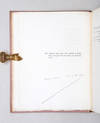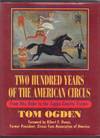
Pilote de guerre (Flight to Arras).
by SAINT-EXUPÉRY, Antoine de
- Used
- Hardcover
- first
- Condition
- See description
- Seller
-
London, United Kingdom
Payment Methods Accepted
About This Item
[New York: Éditions de la Maison française, Inc., Reynal & Hitchcock, Inc.,, c.1941-42]. To Michel Bertin, a set of proofs of a small book about France Presentation set of original galley proofs for Saint-Exupéry's famous wartime memoir, inscribed warmly by him at the head of the first sheet, "À Michel Bertin, ajeu d'epreuves d'un petit livre sur le France avec tout ma trés profonde amitié. Antoine de Saint-Exupéry". An affecting provenance: in the First World War, Bertin served with the French army, winning the Croix de Guerre. In addition to his French decoration, Michel Jean Alexandre Bertin (1890-1957) was awarded the American Distinguished Service Medal, his citation reading, "for exceptionally meritorious and distinguished service in a position of great responsibility to the Government of the United States... as Second Lieutenant of the 5th Regiment of Engineers... as liaison between the DTMA [Directeur des Transports Militaires aux Armees] of the French Army and the Deputy Director General of Transportation at American General Headquarters, by his tactful, capable, and untiring efforts to assist the American Army". After the war, Bertin immigrated to New York, where he carried on a distinguished career in the oil business with Socony (Standard Oil Company of New York). In a copy of Wind, Sand and Stars (1939) that has appeared on the market, Saint-Exupéry inscribed it in French, making an amusing reference to Bertin's position in the oil industry: "for Monsieur Michel Bertin who plays the role of nursemaid for all the pilots of the planet by pouring out to them the milk of the Standard. With a friendship that will be true and the hope to meet him soon in New York". Their reunion indeed took place not long afterwards, with Saint-Exupéry fleeing to New York following the fall of France, to plead his country's case to the American people. It was during this self-imposed exile that Saint-Exupéry wrote Flight to Arras and The Little Prince (1943). Bertin's name appears in the list of acknowledgements for the early biography La Vie de Saint-Exupéry (1948) by René Delange. As that work notes, it was Bertin who introduced Saint-Exupéry to the American general Jimmy Doolittle during the planning phase of the 1942 Doolittle Raid, the first American air raid on Tokyo, made in retaliation for the assault on Pearl Harbor. Were it not for Saint-Exupéry's refusal to learn English, he may have ended up participating in this important mission at Bertin's instigation. Intimately inscribed, these proofs represent a highly personal memento of "a deeply personal book... Conceived as a volume on the fall of France, Flight to Arras was a war book by the time it was published. It won raves on both counts. It was universally thought to dwarf all other accounts of the French defeat; writing in the Atlantic Edward Weeks declared, 'this narrative and Churchill's speeches stand as the best answer the democracies have yet found to Mein Kampf'" (Schiff, pp. 362-3). The work relates the author's own experiences flying in the Armée de l'Air on reconnaissance missions during the Battle of France. It was initially released in America to great success under the auspices of the New York publishing house Reynal & Hitchcock in February 1942, the French version carrying the imprint of the publishing arm of La Maison française, a showcase for French culture in New York established at the Rockefeller Center. The first Paris edition was published by Gallimard towards the end of that year; due to the work's praise of the courage of the Jewish pilot Jean Israël, it was soon banned by both the Vichy government and the occupying Nazi administration, and the majority of copies were destroyed. "By a supreme irony the book was actually less available in Free France than in occupied France, where an underground edition was now circulating" (Schiff, p. 414). The book was subsequently banned in North Africa following the author's public spat with Charles de Gaulle. Saint-Exupéry "watched, indignantly, as crates of French-language titles arrived from New York but his own did not. For the second time Flight to Arras had effectively been censured by his own countrymen" (ibid.) It remained interdicted until the end of the war. Saint-Exupéry reenlisted in the Free French Air Forces in 1943 after persistently petitioning for a special exemption to overlook his poor health and age; then 43, he exceeded the age limit imposed on P-38 pilots. The following year, Saint-Exupéry failed to return after departing from Corsica for another reconnaissance mission. For Flight to Arras, he was posthumously awarded the Grand Prix Littéraire de l'Aéro-Club de France in 1945. "Saint-Exupéry found in aviation both a source for heroic action and a new literary theme. His works exalt perilous adventures at the cost of life as the highest realization of man's vocation" (Ency. Brit.) Together 85 long galley proof sheets (c. 556 x 216 mm), unsewn and folded once. Type set on rectos only in three vertical sections, separately paginated and comprising pp. 9-253. Includes a blank sheet and 2 duplicated sheets. Housed in a custom purple cloth chemise and pink cloth folding box with red morocco label on front. Edges of brittle sheets with very occasional short closed tears or shallow chips, neatly restored in places, final sheet with a tender folded corner just holding. A very nicely preserved example. "Michel Bertin, 67, Ex-Aide of Socony; Vice Chairman of Foreign Trade for Oil Concern Until 1950 is Dead", New York Times, 11 June 1957; René Delange, La Vie de Saint-Exupéry, 1958, pp. 7, 97, and 103; Stacy Schiff, Saint-Exupéry: A Biography, 1994.
Reviews
(Log in or Create an Account first!)
Details
- Bookseller
- Peter Harrington
(GB)
- Bookseller's Inventory #
- 148666
- Title
- Pilote de guerre (Flight to Arras).
- Author
- SAINT-EXUPÉRY, Antoine de
- Book Condition
- Used
- Binding
- Hardcover
- Place of Publication
- [New York: Éditions de la Maison française, Inc., Reynal & Hitchcock, Inc.,
- Date Published
- c.1941-42]
Terms of Sale
Peter Harrington
All major credit cards are accepted. Both UK pounds and US dollars (exchange rate to be agreed) accepted. Books may be returned within 14 days of receipt for any reason, please notify first of returned goods.
About the Seller
Peter Harrington
Biblio member since 2006
London
About Peter Harrington
Since its establishment, Peter Harrington has specialised in sourcing, selling and buying the finest quality original first editions, signed, rare and antiquarian books, fine bindings and library sets. Peter Harrington first began selling rare books from the Chelsea Antiques Market on London's King's Road. For the past twenty years the business has been run by Pom Harrington, Peter's son.
Glossary
Some terminology that may be used in this description includes:
- New
- A new book is a book previously not circulated to a buyer. Although a new book is typically free of any faults or defects, "new"...
- Edges
- The collective of the top, fore and bottom edges of the text block of the book, being that part of the edges of the pages of a...
- Cloth
- "Cloth-bound" generally refers to a hardcover book with cloth covering the outside of the book covers. The cloth is stretched...
- Poor
- A book with significant wear and faults. A poor condition book is still a reading copy with the full text still readable. Any...
- Morocco
- Morocco is a style of leather book binding that is usually made with goatskin, as it is durable and easy to dye. (see also...
- Inscribed
- When a book is described as being inscribed, it indicates that a short note written by the author or a previous owner has been...




